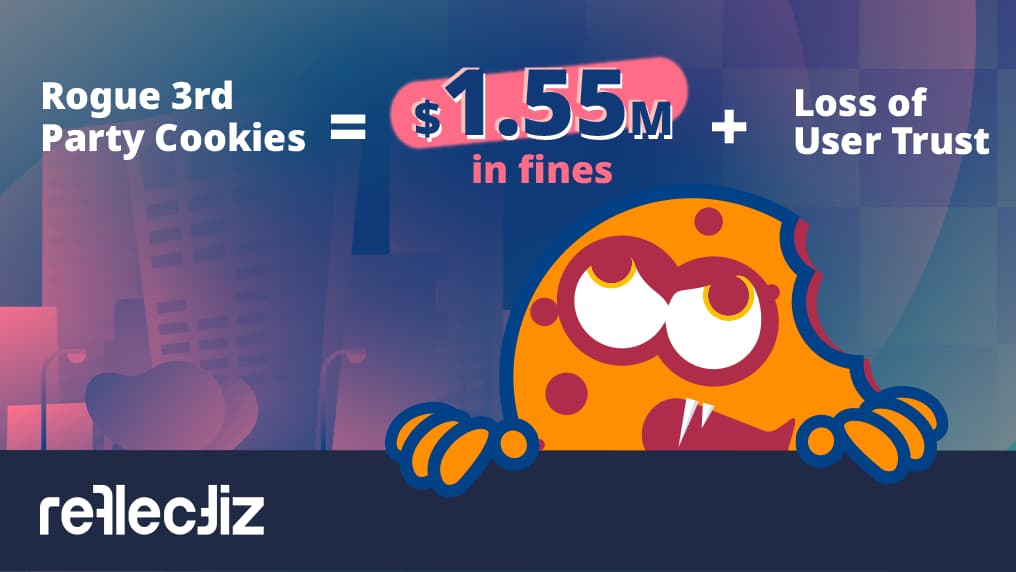How Reflectiz Could Have Helped Healthline Avoid a $1.55M CCPA Fine

What the California AG’s largest CCPA penalty to date means for client-side security and digital compliance.
Introduction: When Compliance Meets the Browser
In July 2025, the California Attorney General’s office (OAG) issued its largest enforcement action to date under the California Consumer Privacy Act (CCPA): a $1.55 million settlement against Healthline Media LLC (Healthline), operator of the globally popular Healthline.com.
The reason? The California Department of Justice found that Healthline’s website failed to honor users’ “Do Not Sell or Share My Personal Information” requests, and shared sensitive health-related data through third-party tracking technologies without obtaining proper consent or providing adequate disclosure.
At first glance, it looks like another corporate privacy fine, but it’s actually a statement of intent. If we look at the larger fines and administrative penalties issued by the OAG since the CCPA came into law…
| Date Issued | Company | Fine Amount |
| August 24, 2022 | Sephora USA, Inc. | $1.2 million |
| February 14, 2024 | DoorDash, Inc. | $375,000 |
| March 12, 2025 | American Honda Motor Co., Inc. | $632,500 |
| May 6, 2025 | Todd Snyder, Inc. | $345,178 |
| July 1, 2025 | Healthline Media LLC | $1.55 million |
| September 30, 2025 | Tractor Supply Co. | $1.35 million |
…it’s clear that 2025 has seen a sharp acceleration in CCPA enforcement, with four of the six largest actions to date happening in this year. This uptick suggests that the Attorney General’s office and the California Privacy Protection Agency (CPPA) are signaling to businesses that any caught committing client-side compliance failures can expect strong action.
The client-side distinction is critical here because privacy regulators increasingly view the digital front end — scripts, tags, and pixels running in users’ browsers — to be part of the regulated environment. This is precisely where Reflectiz offers unmatched visibility and protection.
Double Jeopardy
It’s worth noting that as of October 2025, the CPPA has not issued any administrative fines. All 2025 actions listed here were OAG civil penalties, but that could change because the CPPA and OAG have overlapping authority. The CPPA carries out administrative enforcement, and the OAG covers civil litigation (although both enforce the same law):
| Type | Issued By | Process |
| Administrative Fine | CPPA | Regulatory hearing → Final Order |
| Civil Penalty | OAG | Lawsuit or settlement in court |
Civil and administrative penalties are not mutually exclusive, so it’s possible that a business could face penalties from both authorities for the same conduct! If it misleads California consumers with deceptive cookie banner opt-outs, for example, it could find itself on the receiving end of a CPPA admin fine and an OAG civil settlement for deceptive practices. But that isn’t the end of it.
If the case also involves a data breach, that business could also face a class action lawsuit from breach victims. Private class actions can add statutory damages of $100–$750 per consumer to the penalties total. That’s why, if your online business has California customers, you need to make sure your tracking technologies are CCPA-compliant.
The Case Breakdown: What Went Wrong at Healthline
According to the Attorney General’s public announcement, the settlement came about because of several interconnected failures:
1. Opt-Out Requests Were Ineffective
When visitors used the “Do Not Sell or Share My Personal Information” button, 118 third-party cookies still collected their behavioral data for targeted advertising purposes. The fact that the opt-out mechanism was broken was characterized as a deceptive trade practice under California’s Unfair Competition Law.
2. Unauthorized Sharing of Sensitive Data
Healthline shared article titles that users had viewed. Some of them implied medical diagnoses (e.g., “The Ultimate Guide to MS for the Newly Diagnosed”). This enabled advertisers to infer sensitive health information without user consent, and this wasn’t adequately disclosed in the privacy policy.
3. Non-Compliant Vendor Contracts
Contracts with third-party advertisers allowed data use “for any purpose.” The CCPA requires service providers and contractors to process data only for purposes that users have agreed to.
4. Lack of Third-Party Tracking Oversight
Healthline’s website hosted numerous third-party scripts whose data-sharing behaviors were not fully monitored or managed.
The outcome of these five issues was a $1.55 million penalty and a mandate for Healthline to implement a compliance program, including regular audits of digital properties and technical verification that privacy preferences are respected in real time.
This enforcement action highlights that client-side misconfigurations, not just back-end issues, can trigger significant regulatory penalties.

The Bigger Message: Compliance Is No Longer a Policy Problem
The Healthline case signals a shift in privacy enforcement. Regulators are now focusing on technical verification, moving beyond static privacy policies and consent banners to examine how websites actually function.
The California Attorney General tested Healthline’s site, analyzing script behavior, cookie settings, and the effectiveness of consent mechanisms. The fine underscores that “good intentions” aren’t sufficient; compliance must be demonstrable and verifiable.
In other words: If you can’t prove it, it didn’t happen.
The Client-Side Attack Surface: Hidden in Plain Sight
Modern websites like Healthline.com rely on a complex web of third-party technologies: analytics tools, ad networks, personalization engines, and tracking pixels. These enhance user experience, but they also expand the client-side attack surface, the part of the website that executes in the user’s browser.
Each third-party script can load additional scripts, cookies can transmit personal data to external services, and cross-domain requests may expose sensitive identifiers. Traditional security and privacy tools often overlook this space, as Web Application Firewalls and vulnerability scanners focus on server-side issues, leaving a blind spot where sensitive data, like inferred health conditions, can leak undetected.
This is the gap Reflectiz addresses.
Reflectiz: Making the Invisible Visible
Reflectiz is a client-side security and compliance visibility platform that continuously monitors the user-facing side of your digital ecosystem, without the need for code changes and with no performance impact.
Unlike traditional scanners, Reflectiz:
– Builds a live inventory of every third- and fourth-party script.
– Analyzes script behavior, including data transmission patterns.
– Maps data flows to external domains to detect unauthorized sharing.
– Alerts teams to new or risky assets.
If Reflectiz had been active on Healthline’s site, its Privacy Control could have helped the company mitigate many of the compliance gaps identified by the Attorney General:
| Regulatory Finding | How Reflectiz Could Have Helped |
| Unauthorized sharing of sensitive article data | Dynamic asset inventory identifies trackers sharing sensitive data |
| Unverified third-party vendors | Automated tagging and classification of vendors by compliance type |
| Non-compliant vendor contracts | Continuous mapping of data flows to external processors |
| Mandated compliance audits | Provides continuous data to exceed audit requirements |
Client-Side Compliance Is the New Frontier
Why are regulators targeting the client side? Because that’s where most consumer data flows today. On a site like Healthline.com, dozens of third-party tags can collect data the moment a user lands, before any form is submitted. Behavioral tracking, browser fingerprinting, and ad retargeting all occur client-side, often beyond an organization’s direct control.
The CCPA explicitly identifies tracking technologies as mechanisms for “selling or sharing” personal information. The Healthline case, with its focus on inferred health data, underscores that client-side visibility is not just a security issue but a compliance necessity.
Reflectiz empowers teams to answer critical questions with evidence: What data are we collecting? Which vendors process it? Are we honoring user privacy choices consistently? The Privacy Dashboard puts the answers at their fingertips.
Continuous Monitoring Beats Periodic Auditing
The Attorney General’s settlement requires Healthline to implement a compliance program with regular audits of its digital assets. This is a step forward, but it’s not enough.
Client-side environments are dynamic. Marketing teams add tags, vendors update scripts all the time, and configurations change frequently, so periodic audits can miss violations that emerge between checks.
Reflectiz replaces static audits with continuous visibility. Its monitoring engine detects changes in real time, flags risky behaviors, and provides privacy teams with actionable context.
This transforms compliance from a reactive burden into a proactive assurance function.
Beyond Privacy: Security and Reputation Implications
Although the CCPA focuses on protecting user privacy, the same client-side blind spots can also lead to security risks.
Malicious code injection, formjacking, or unauthorized data harvesting exploit the same lack of visibility. A compromised script could steal sensitive user data, like health-related browsing behavior, directly from the browser, bypassing server-side controls.
By continuously mapping and analyzing scripts, Reflectiz provides early warnings for suspicious or malicious changes, helping prevent data breaches and protect brand reputation.
Lessons for Every Digital Business
The Healthline case is a wake-up call for any organization with a consumer-facing website or app. Key lessons:
– Consent banners alone aren’t enough—regulators test functionality.
– Map your digital supply chain—every script and tag matters.
– Integrate privacy with security.
– Shift from periodic audits to continuous assurance.
With Reflectiz, companies gain operational control over their client-side environments.
Conclusion: From Enforcement to Empowerment
The California Attorney General’s fine against Healthline isn’t just a headline, it’s a glimpse into the future of privacy: technical, continuous, and client-side focused.
Organizations that invest in visibility and automation today will be better positioned tomorrow, not only to avoid fines but to build greater user trust through transparency.
Reflectiz delivers that visibility. It turns complex, fragmented client-side behavior into actionable intelligence: empowering teams to protect data, ensure compliance, and demonstrate accountability.
See what’s really running on your website before regulators do. Request a Reflectiz compliance visibility demo today.
Subscribe to our newsletter
Stay updated with the latest news, articles, and insights from Reflectiz.
Your Website looks great!
But what’s happening behind the scenes?
Discover your website blind spots and vulnerabilities before it’s too late!







